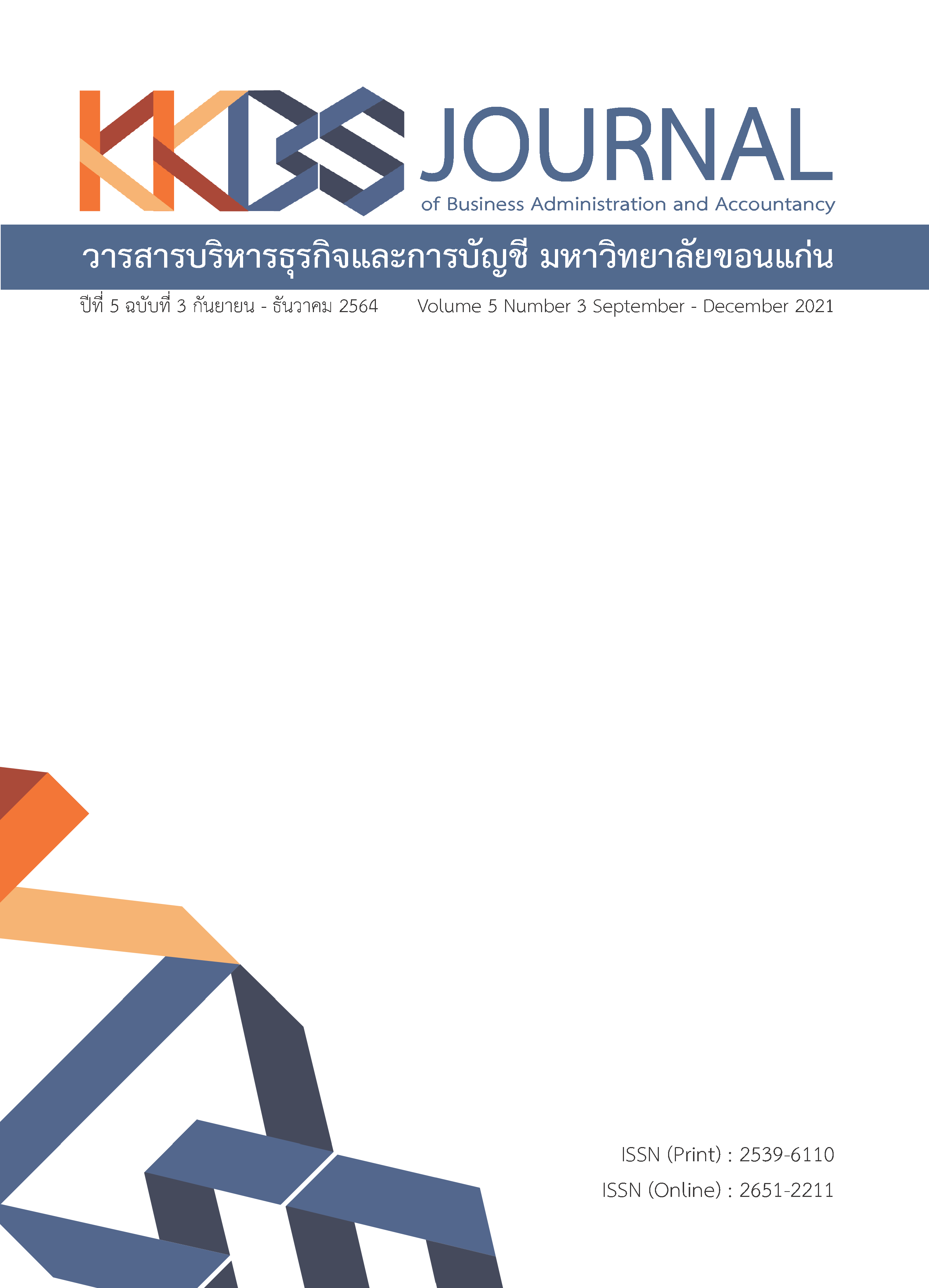ปัจจัยที่ส่งผลกระทบต่อการรับรู้ความดั้งเดิมและความจงรักภักดีของผู้เข้าร่วมงาน สีฐานเฟสติวัล จังหวัดขอนแก่น
Main Article Content
บทคัดย่อ
การวิจัยในครั้งนี้มีวัตถุประสงค์เพื่อศึกษาปัจจัยที่ส่งผลต่อการรับรู้ดั้งเดิมและความจงรักภักดีของผู้เข้าร่วมงานสีฐานเฟสติวัล จังหวัดขอนแก่น โดยใช้แบบสอบถามเป็นเครื่องมือในการเก็บรวบรวมข้อมูลจาก ผู้ที่ประสบการณ์ในการเข้าร่วมงานสีฐานเฟสติวัล จังหวัดขอนแก่น จำนวน 150 คน ในการวิจัยในครั้งนี้ใช้การวิเคราะห์โดยการถดพหุคุณ (Multiple Regression Analysis) เพื่อตอบสมมติฐาน จากผลการวิจัยพบว่า ปัจจัยที่ส่งผลต่อการรับรู้ดั้งเดิมในด้าน 1) ด้านรายการการจัดกิจกรรมภายในงาน 2) ด้านการให้บริการข้อมูลภายในงาน 3) ด้านสิ่งอำนวยความสะดวกภายในงาน 4) ด้านความเป็นเอกลักษณ์ของ มีผลต่อการรับรู้ดั้งเดิมของงานสีฐานเฟสติวัล จังหวัดขอนแก่น อีกทั้งการรับรู้ความดั้งเดิมของงานสีฐานเฟสติวัล จังหวัดขอนแก่น นั้นยังส่งผลต่อความจงรักภักดีของผู้เข้าร่วมงานงานสีฐานเฟสติวัล จังหวัดขอนแก่น ดังนั้น ผู้จัดงานสีฐานเฟสติวัลควรให้ความสำคัญต่อปัจจัยในด้านต่าง ๆ ที่ส่งผลต่อการรับรู้ดั้งเดิม เพื่อเพิ่มศักยภาพในการสร้างความพึงพอใจและประสบสบการณ์ทางบวกในการรับรู้ความดั้งเดิม ประเพณีเกี่ยวกับงานลอยกระทงของภาคตะวันออกเฉียงเหนือที่มีมาตั้งแต่ดังเดิม นอกจากนี้ผู้เข้าร่วมงานมีความเกิดการจงรักภักดีต่องานสีฐานเฟสติวัลในการบอกต่อ เผยแพร้ข้อมูลในทางบวกผ่านสื่อสังคมออนไลน์ การศึกษาครั้งนี้ยังเป็นาการเพื่อเป็นการกระตุ้นการเจริญเติบโตทางด้านเศรษฐกิจของจังหวัดขอนแก่นและรวมทั้งเกิดการกระจายรายได้สู่คนในชุมชนโดยรอบมหาวิทยาลัยขอนแก่น
Article Details
บทความที่ได้รับการตีพิมพ์ในวารสารเป็นความคิดเห็นของผู้เขียน มิใช่ความคิดเห็นของกองบรรณาธิการและคณะผู้จัดทำวารสาร และบทความที่ได้รับการตีพิมพ์เป็นลิขสิทธิ์ของวารสารบริหารธุรกิจและการบัญชี มหาวิทยาลัยขอนแก่น
เอกสารอ้างอิง
Akhoondnejad, A. (2016). Tourist loyalty to a local cultural event: The case of Turkmen handicrafts festival. Tourism Management, 52(C), 468-477.
Bladen, C., Kennell, J., Abson, E. & Wilde, N. (2012). Events management: An introduction. London: Routledge.
Castéran, H. & Roederer, C. (2013). Does authenticity really affect behavior? The case of the Strasbourg Christmas Market. Tourism Management, 36(C), 153-163.
DiPietro, R.B. & Levitt, J. (2019). Restaurant authenticity: factors that influence perception, satisfaction and return intentions at regional American-style restaurants. International Journal of Hospitality & Tourism Administration, 20(1), 101-127.
Esanbiz. (2020). Sithan KKU Festival Esanbiz company. Retrieved August 20, 2019, from
Getz, D. & Page, S. J. (2016). Progress and prospects for event tourism research. Tourism Management, 52, 593-631.
Green, S.B. (1991). How many subjects does it take to do a regression analysis. Multivariate Behavioral Research, 26(3), 499-510.
Hair et al. (2006). Multivariate data analysis. 6th ed. Upper Saddle River, NJ.: Pearson Prentice Hall.
Khon Kaen University. (2020). Sithan KKU Festival. Retrieved August 20, 2019, from
https://eng.kku.ac.th/sithankkufestival
Leckie, C., Nyadzayo, M.W. & Johnson, L.W. (2016). Antecedents of consumer brand engagement and brand loyalty. Journal of Marketing Management, 32(5-6), 558-578.
Lee, T.H. & Chang, P.-S. (2017). Examining the relationships among festivalscape, experiences, and identity: evidence from two Taiwanese aboriginal festivals. Leisure Studies, 36(4), 453-467.
Mahittivanicha, N. (2020). Statistics and social media using behaviour in 2020. Retrieved August 20, 2019 from https://www.twfdigital.com/blog/2020/02/global-social-media-usage-stats-q1-2020/ (In Thai)
Ministry of Culture. (2014). Loy Kratong festival. Bangkok: Department of Cultural Promotion.
Novello, S. & Fernandez, P.M. (2016). The influence of event authenticity and quality attributes on behavioral intentions. Journal of Hospitality & Tourism Research, 40(6), 685-714.
Phonphithak, K. et al.(2020). The influence of tourism attribute on tourist's perceived value of the tourism community-based in The Khong River Basin, Nong Kai Province. KKBS Journal of Business Administration and Accountancy, 4(1), 1-20. (In Thai)
Robinson, R.N. & Clifford, C. (2012). Authenticity and festival foodservice experiences. Annals of Tourism Research, 39(2), 571-600.
Shone, A. & Parry, B. (2004). Event management a practical handbook. 2nd ed. London: Taylor & Francis.
Tanford, S. & Jung, S. (2017). Festival attributes and perceptions: A meta-analysis of relationships with satisfaction and loyalty. Tourism Management, 61, 209-220.
Vichitrboonyaruk, P. (2014). Social media: Future media. Executive Journal, 31(4), 99-103. (In Thai)
Woosnam, K.M. & Aleshinloye, K.D. (2018). Residents’ emotional solidarity with tourists: Explaining perceived impacts of a cultural heritage festival. Journal of Hospitality & Tourism Research, 42(4), 587-605.
Wu, C.-W. (2016). Destination loyalty modeling of the global tourism. Journal of Business Research, 69(6), 2213-2219.
Yi, X., Fu, X., Yu, L. & Jiang, L. (2018). Authenticity and loyalty at heritage sites: The moderation effect of postmodern authenticity. Tourism Management, 67, 411-424.
Yoon, Y. & Uysal, M. (2005). An examination of the effects of motivation and satisfaction on destination loyalty: a structural model. Tourism Management, 26(1), 45-56.
Zhang, T., Chen, J. & Hu, B. (2019). Authenticity, quality, and loyalty: Local food and sustainable tourism experience. Sustainability, 11(12), 3437.
Zorilla, J.J. (2000). Authenticity in the context of ethnic tourism: the local perspective. Canada: Travel and Tourism Research Association.


